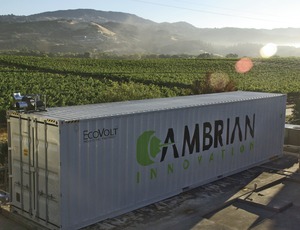
Craft breweries in drought-stricken Sonoma County, Calif., are testing a novel process that generates power while recycling wastewater.
Developed by an MIT spin-off firm, the EcoVolt system "takes the wastewater stream and, through anaerobic technology, turns it into methane gas that we then turn into electricity using a micro- turbine," says Leon Sharyon, CFO of craft brewery Lagunitas. Matthew Silver, a former MIT researcher and co-founder of Cambrian Innovation, Boston, developed the technology from past research on life-support systems for space stations. Cambrian is part of a cluster of Massachusetts water-technology firms.
"We put electrodes in the system, populate them with the electrically active microbes that chew up the pollutants and generate a small electric charge," Silver says. A second set of electrodes returned to the reactor consume the electricity and, through a process called electromethanogenesis, convert power and carbon dioxide into methane. Clean water is a by-product of the process. Lagunitas has paid $1.24 million, or about 40% of the cost, to buy a two- or three-unit EcoVolt system to treat 50,000 gallons of wastewater a day. It now is building headworks to accommodate up to six units. Early beta testing is set to begin by August. Silver says the system can handle from 40,000 to 100,000 gpd of treatment capacity.
Installing EcoVolt units should eliminate off-site wastewater transport for disposal, a $1.5-million annual expense, Sharyon says. Many breweries face similar problems because they produce wastewater rich in nutrients that disrupt municipal systems.
The savings, combined with lower power and heating costs and a renewable-energy credit, will make the system pay for itself within 18 months, Sharyon predicts. EcoVolt is highly scalable, and it "is connected to the cloud, allowing remote monitoring of California systems from Boston, minimizing operations cost," he adds. Bear Republic Brewery, Cloverdale, which installed a pilot system in December, says it could provide 50% of base-load needs, says a spokesman "The No. 1 thing [that made us choose the technology] was the size of the self-contained units," he says.
Since its founding in 2006, Cambrian has received $8 million in federal funding, including work under a Defense Dept. contract to make a self-powered wastewater treatment facility for operating bases and for off-grid applications in developing countries, say published reports. The firm also secured $345,000 in small-business funds from the U.S. Environmental Protection Agency. A spokeswoman says EcoVolt is "significantly less expensive" than other market technologies, which can be cost-prohibitive for smaller municipalities and treatment systems.





Post a comment to this article
Report Abusive Comment